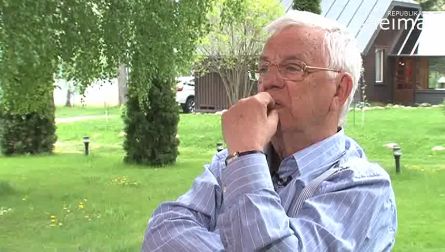| Raimonds Pauls |
 |
|
Interviewer. Do you remember the Putsch? It was August, a beautiful summer‚Ķ ¬† R. Pauls. Yes, for me‚Ķ really. Their only guide could be television‚Ķ ¬† Interviewer. The "Dance of the Little Swans"‚Ķ ¬† R. Pauls. You see, this is how it was for me. I kept watching Pugo [Boris Pugo, First Secretary of the Communist Party of the Latvian SSR; later, Minister of the Interior Affairs of the USSR] because I knew Pugo. How did I know him? He and I have‚Ķ I always remember him by his catchphrase; he used to say it to me all the time‚Ķ He used to walk down the street ‚Äď it was something new back then ‚Äď without a security detail, after Voss [Augusts Voss, First Secretary of the Communist Party of the Latvian SSR before Pugo] it was a different matter entirely‚Ķ And he said: ‚ÄúYou know, of all music I like chamber music the best.‚ÄĚ You get it, right? ‚ÄúChamber...‚ÄĚ [In Russian the word chamber can also mean cell.] He was a former‚Ķ But he was, by the way, an intelligent man; it was a pleasure to speak with him and so on. ¬† ¬† Interviewer. Well, back to the Putsch. You were watching the hands? ¬† R. Pauls. We were watching it all‚Ķ I had a deep fear‚Ķ ¬† Interviewer. Well, when they were sitting there‚Ķ ¬† R. Pauls. I was afraid. I was aware that this might be a terrible turning point. That there might‚Ķ ¬† Interviewer. But where were you? Where were you at that time? ¬† R. Pauls. Yes, all kinds of things were going on here. Cilinskis [EinńĀrs Cilinskis, member of the Supreme Council of the Republic of Latvia], as far as I know, hid here at one point; Vaznis [Aloizs Vaznis, Minister for the Interior] also hid, and then we had to flee‚Ķ The ministers had to flee to Lńęgatne, to those bunkers somewhere because that night the only one ‚Äď my hat off to him! ‚Äď the only one who stayed at the Council of Ministers was Ivars [Ivars Godmanis, Chairman of the Council of Ministers of the Republic of Latvia]. The rest of us were sent off somewhere because supposedly I was also on that list of people to be killed. ¬† Interviewer. Well, but were you afraid for your family as well? ¬† R. Pauls. Well, for everything, dear God! ¬† Interviewer. We are all human. ¬† R. Pauls. Yes, and we remember all those deportations, everything‚Ķ no one plays tricks like that‚Ķ ¬† Interviewer. But what do you think determined the idiocy of the Putsch‚Ķ the organisation wasn‚Äôt‚Ķ well, the organisation had so little talent‚Ķ ¬† R. Pauls. You have to understand ‚Äď that time‚Ķ In general, Russia is unpredictable. No one can ever conquer Russia. ¬† Interviewer. But what would have happened if instead of three days the Putsch had lasted for, say, a week or ten days? ¬† R. Pauls. A bloodbath. ¬† Interviewer. Would there have been a bloodbath? ¬† R. Pauls. What else could there be? What else could happen? ¬† Interviewer. Were you familiar with Kuzmins from the military district? ¬† R. Pauls. So, so‚Ķ ¬† Interviewer. That he had phoned Gorbunovs [Anatolijs Gorbunovs, Chairman of the Supreme Council of the Republic of Latvia] and had threatened‚Ķ A lot had gone on, of course‚Ķ ¬† R. Pauls. Well, yes‚Ķ who can‚Ķ He was a military man; he had to obey orders‚Ķ But it‚Äôs a good thing that he did not issue that order. ¬† Interviewer. It‚Äôs good that he didn‚Äôt‚Ķ ¬† R. Pauls. He could have ordered the Baltic Military District‚Ķ And they would have destroyed‚Ķ ¬† Interviewer. Tanks would be driven over and‚Ķ ¬† R. Pauls. Dear God‚Ķ I saw‚Ķ once‚Ķ Back then Bartkevińćs [Leonards Bartkevińćs, member of the Supreme Council of the Republic of Latvia]‚Ķ on assignment from the Radio, we had to go to Irbe, where there was some kind of tank firing ground. And that was the first time I saw 50 tanks standing next to one another‚Ķ. That is terrifying! ¬† Interviewer. The big ones? ¬† R. Pauls. That is‚Ķ If an iron block like that comes at you‚Ķ They completely wipe out everything‚Ķ You know, sometimes there are things you can thank God for. Yes, there are things like that! We can be thankful that everything that happened in Riga didn‚Äôt turn into a dreadful bloodbath. We can thank God that the army was not involved in all these‚Ķ if the army had been involved, I am sure this whole affair would have had a dreadful ending. We were lucky. We were lucky! |

